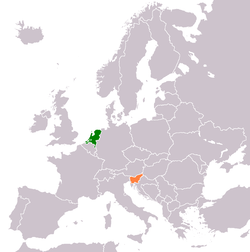
The foreign policy of the Netherlands is based on four basic commitments: to the Atlantic cooperation, to European integration, to international development and to international law. While historically the Kingdom of the Netherlands was a neutral state, since 1945 it has become a member of NATO, the United Nations, the European Union and many other international organizations. The Dutch economy is very open and relies on international trade. During and after the 17th century—its Golden Age—the Dutch built up a commercial and colonial empire. It was a leading shipping and naval power and was often at war with England, its main rival. Its main colonial holding was Indonesia, which fought for and achieved independence after 1945. The historical ties inherited from its colonial past still influence the foreign relations of the Netherlands. Foreign trade policy is handled by the European Union. The Dutch have been active in international peacekeeping roles.
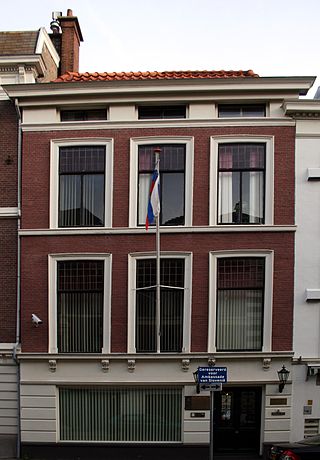
Since Slovenia declared independence in 1991, its Governments have underscored their commitment in improving cooperation with neighbouring countries and to actively contribute to international efforts aimed at bringing stability to Southeast Europe. Resource limitations have nevertheless been a problem hindering the efficiency of the Slovenian diplomacy. In the 1990s, foreign relations, especially with Italy, Austria and Croatia, triggered internal political controversies. In the last eight years, however, a wide consensus has been reached among the vast majority of Slovenian political parties to jointly work in the improvement of the country's diplomatic infrastructure and to avoid politicizing the foreign relations by turning them into an issue of internal political debates.

Germany–Slovenia relations are the foreign relations between Germany and Slovenia. Germany–Slovenia state relations are good and harmonious. Both countries established diplomatic relations on 15 January 1992. Germany has an embassy in Ljubljana. Slovenia has an embassy in Berlin and a general consulate in Munich. Both countries are full members of the Council of Europe, the European Union and NATO. There are more than 50,000 Slovenes living in Germany and more than 50,000 Germans living in Slovenia. During the first years of Slovenian independence, Germany was a strong advocate for the self-determination of Slovenes, and instituted a comprehensive consulting and support program for the promotion of democratization and market reform process in Slovenia. It also supported Slovenian accession to the EU and NATO.

Russia–Slovenia relations are foreign relations between Russia and Slovenia. Both countries established diplomatic relations on May 25, 1992. Russia has an embassy in Ljubljana. Slovenia has an embassy in Moscow and two honorary consulates. Until 2022, Russia had five honorary consuls in Slovenia, but Slovenia withdrew its consent to the appointments due to the Russian invasion of Ukraine. Both countries are full members of the Council of Europe and the Organization for Security and Co-operation in Europe.

Dutch-Greek relations are foreign relations between the Netherlands and Greece. Since 1834, both countries have diplomatic relations. The Netherlands have an embassy in Athens and 12 honorary consulates in Corfu, Herakleion, Kalamata, Kavala, Patras, Piraeus, Rhodes, Samos, Syros, Thessaloniki, Volos, and Ioannina. Greece has an embassy in The Hague, and a consulate-general in Rotterdam. Both countries are full members of the Council of Europe, the European Union and NATO.
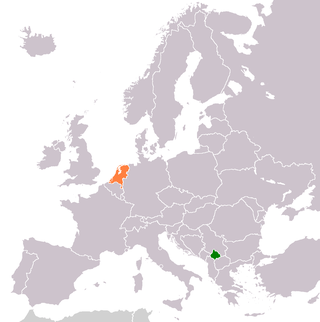
Kosovo–Netherlands relations are foreign relations between Kosovo and the Netherlands. Kosovo declared its independence on 17 February 2008 and the Netherlands recognised it on 4 March 2008. The Netherlands have maintained an embassy in Pristina since 27 June 2008, and Kosovo opened an embassy in The Hague in November 2009. Relations between the two countries are considered to be good and the Netherlands offers support to various projects in Kosovo with the goal of aiding the country in its transition to democracy.

Foreign relations exist between Austria and Netherlands. Austria has an embassy in The Hague and 2 honorary consulates. The Netherlands have an embassy in Vienna and 6 honorary consulates. Both countries are full members of the Council of Europe and the European Union.

Bulgarian-Dutch relations are foreign relations between Bulgaria and the Netherlands. Bulgaria has an embassy in The Hague. The Netherlands has an embassy in Sofia. Both countries are members of the European Union and the NATO. the Netherlands has given full support to Bulgaria's membership in the European Union and NATO.

Croatian–Dutch are foreign relations between Croatia and Netherlands. Both countries established diplomatic relations on April 23, 1992. Croatia has an embassy in The Hague. The Netherlands have an embassy in Zagreb and 3 honorary consulates . Both countries are full members of the Council of Europe, European Union and NATO. Netherlands joined the EU as a founding member state, and Croatia joined the EU in 2013. The Netherlands has given full support to Croatia's membership in the European Union and NATO.
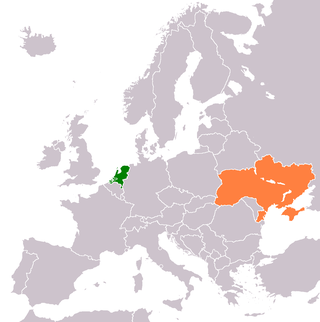
Netherlands–Ukraine relations are foreign relations between the Netherlands and Ukraine. The two countries established diplomatic relations in 1992. Notable incidents in their relations include was the shoot-down of Malaysia Airlines Flight 17 in 2014 and the 2016 Dutch Ukraine–European Union Association Agreement referendum. the Netherlands is a member of the European Union, which Ukraine applied for in 2022. Both countries are full members of Council of Europe.

Dutch-Serbian are foreign relations between the Netherlands and Serbia. Both countries re-established diplomatic relations on April 26, 1899. Both countries are full members of the Council of Europe. The Netherlands is an EU member while Serbia is an EU candidate.

Dutch-Hungarian relations are foreign relations between the Netherlands and Hungary. The Netherlands have an embassy in Budapest and an honorary consulate in Pécs. Hungary has an embassy in The Hague and 6 honorary consulates.
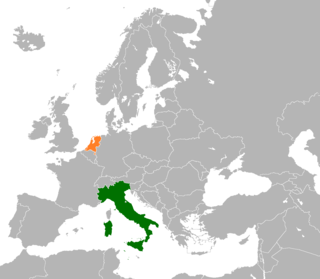
Italy–Netherlands relations are the foreign relations between the Italian Republic and the Kingdom of the Netherlands.

Israel–Netherlands relations are foreign relations between Israel and the Netherlands. The Netherlands has an embassy in Ramat Gan, an information office in Jerusalem and two honorary consulates in Eilat and Haifa. Israel has an embassy in The Hague. Both countries are full members of the Union for the Mediterranean.
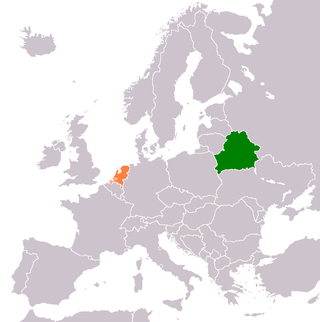
Belarus and the Netherlands established diplomatic relations in 1994. Belarus has an embassy and an honorary consulate in The Hague. The Netherlands is represented in Belarus through its embassy in Warsaw (Poland) and through an honorary consulate in Minsk. Both countries are full members of the Organization for Security and Co-operation in Europe.

Moldova–Slovenia relations are the bilateral relations between the two countries, Moldova and Slovenia. Moldova recognized the Republic of Slovenia under an unknown date. Diplomatic relations were established on October 27, 1993. Both countries are represented in each other through their embassies in Budapest (Hungary). Slovenia is a member of the European Union, which Moldova applied for in 2022. Both countries are full members of Council of Europe.

Albania has an embassy in the Hague and the Netherlands has an embassy in Tirana.

The Netherlands–Pakistan relations refers to the bilateral, economic, cultural and historical relations between the Netherlands and Pakistan. The Netherlands maintains a permanent embassy in Islamabad and honorary consulates in Karachi and Lahore. Pakistan has an embassy in The Hague.

Georgia–Slovenia relations are the bilateral relations between Georgia and Slovenia, two European nations with a communist past that established their bilateral ties in 1993. Their relations have been highly represented with a close diplomatic partnership, with Slovenia being one of the staunch supporters of Georgia's territorial integrity and pro-Western path. Slovenia is a member of the European Union, which Georgia applied for in 2022. Both nations are members of the Council of Europe.

Georgia–Netherlands relations are the bilateral and diplomatic relations between Georgia and the Netherlands. Georgia has an embassy in The Hague, which opened in 2007. The Netherlands has an embassy in Tbilisi since 2001. The countries established diplomatic relations on 22 April 1992. Both countries are full members of the Council of Europe. the Netherlands is a member of the European Union, which Georgia applied for in 2022.
